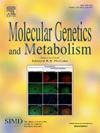Defining lung pathogenesis in a murine model of mucopolysaccharidosis Type I by proteomic analysis
IF 3.5
2区 生物学
Q2 ENDOCRINOLOGY & METABOLISM
引用次数: 0
Abstract
Mucopolysaccharidosis type I (MPS I) is a rare lysosomal storage disorder resulting from a deficiency in the lysosomal enzyme alpha-L-iduronidase, which degrades heparan sulfate and dermatan sulfate glycosaminoglycans (GAG) within endosome-lysosome compartments. MPS I patients demonstrate respiratory dysfunction with varying symptoms and severity during disease progression, which has been associated primarily with upper airway involvement and the thoracic cavity. However, the involvement of respiratory complications in patient morbidity and mortality suggests that we know relatively little about the pathogenic process in the lung. Using a proteomics approach, we analyzed lung tissues from a murine model of MPS I to identify proteins and molecular pathways contributing to respiratory pathology. A total of 7604 proteins were identified, of which 144 were significantly upregulated, 93 downregulated, and three proteins (GPNMB, SLC39A1, ABCC10) were uniquely detected in MPS I lung tissue compared to control lung tissue. Gene ontology analysis confirmed significant disruptions to lysosomal biogenesis, GAG degradation pathways, and extracellular matrix remodelling. Immunohistochemistry showed elevated LAMP I expression, which was consistent with the proteomic results and endosome-lysosome dysfunction being a key driver of disease pathogenesis in the MPS I lung. Our findings reveal novel proteomic alterations underlying distal lung pathology in MPS I and identify potential biomarkers that may have clinical utility for monitoring disease progression.
通过蛋白质组学分析确定粘多糖病1型小鼠模型的肺发病机制。
粘多糖病I型(MPS I)是一种罕见的溶酶体贮积症,由溶酶体酶α -l -伊杜糖醛酸酶缺乏引起,该酶可降解内溶酶体腔室中的硫酸肝素和硫酸皮聚糖糖胺聚糖(GAG)。MPS I型患者在疾病进展过程中表现出不同症状和严重程度的呼吸功能障碍,这主要与上呼吸道受累和胸腔有关。然而,呼吸系统并发症对患者发病率和死亡率的影响表明,我们对肺部的致病过程知之甚少。使用蛋白质组学方法,我们分析了小鼠MPS I模型的肺组织,以确定导致呼吸病理的蛋白质和分子途径。共鉴定出7604个蛋白,其中144个蛋白显著上调,93个蛋白下调,与对照肺组织相比,在MPS I肺组织中唯一检测到3个蛋白(GPNMB、SLC39A1、ABCC10)。基因本体分析证实了对溶酶体生物发生、GAG降解途径和细胞外基质重塑的显著破坏。免疫组织化学显示LAMP I表达升高,这与蛋白质组学结果一致,内溶酶体功能障碍是MPS I肺疾病发病的关键驱动因素。我们的研究结果揭示了MPS I远端肺病理的新蛋白质组学改变,并确定了可能具有监测疾病进展临床效用的潜在生物标志物。
本文章由计算机程序翻译,如有差异,请以英文原文为准。
求助全文
约1分钟内获得全文
求助全文
来源期刊

Molecular genetics and metabolism
生物-生化与分子生物学
CiteScore
5.90
自引率
7.90%
发文量
621
审稿时长
34 days
期刊介绍:
Molecular Genetics and Metabolism contributes to the understanding of the metabolic and molecular basis of disease. This peer reviewed journal publishes articles describing investigations that use the tools of biochemical genetics and molecular genetics for studies of normal and disease states in humans and animal models.
 求助内容:
求助内容: 应助结果提醒方式:
应助结果提醒方式:


